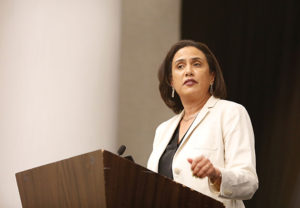Building a successful career is all about mindset. Mentors, coaches, and supporters are key contributors, but the single most important factor is you.
“You are the CEO driving your life and your career,” said Kirsten Bibbins-Domingo, PhD, MD, MAS, chair and professor of Epidemiology and Biostatistics at the University of California San Francisco School of Medicine. “Your friends, coaches, mentors, and supporters are your board of directors, but you are the person in charge.”
Dr. Bibbins-Domingo delivered the keynote address for the 2018 Diversity Forum on Sunday. The lunch also honored the 40 recipients of Minority Trainee Development Scholarships. All of the winners are presenting abstracts this week at ATS International Conference.

Kirsten Bibbins-Domingo, PhD, urged Diversity Forum attendees to take charge and trust their instincts as they pursued career goals.
Matriculating through public schools to Princeton, the University of Ibadan, Nigeria, and the University of California doesn’t happen by chance, especially for minority students and women.
“I was lucky enough to have a great set of public school teachers and guidance counselors who steered me to Princeton,” Dr. Bibbins-Domingo said. “Most of us got to where we are because we did the right things at the right times. What I learned from the journey is that you can—you must—take control of that journey. Pay attention to what motivates you, the people around you, your institution.”
A single patient she saw at San Francisco General Hospital helped shape her career. A 40-year-old black man died of heart failure. Defying conventional wisdom, his first episode of heart failure occurred at two years of age.
“As a fellow, I decided to study heart failure in young adults,” she explained. “My mentor objected, noting that heart failure is a disease of the elderly. Except I knew it wasn’t. We now know that heart failure is more common in African-Americans and tends to occur earlier. Knowing that health events begin earlier in poor communities changes how we think about prevention and treatment. A more diverse workforce and more diverse clinical trial populations makes all of the difference in the awareness of disparities across different communities. The things that form the basis of your career are the things that fascinate you or anger you. That emotional commitment will support you through the journey.”
